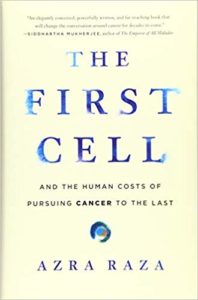Refuse to Take Things for Granted
By Amy Willis
We hear in the news of the tremendous progress we’ve made in treating cancer. But just how much should we celebrate such news? In this episode, oncologist, author, and “cancer widow” Azra Raza says we’re still employing the exact same treatment courses- slash, poison, and burn- we’ve been using for decades. Fortunately, doctors have been able to identify cancer earlier in patients, which helps explain higher survival rates. But at what cost does this progress come?
Raza suggests that rather than trying to kill “the last” cancer cell in any given patient, we instead focus our energies on the search for “the first” cancer cell. In her book, The First Cell, Raza combines policy and personal advice. Host Russ Roberts tells us early on he was prepared to hate this book. But that’s not at all how it turned out. What did you take from this episode?

Raza admits she’d accept treatment for cancer, even knowing how awful it might be. So what’s wrong with the traditional approaches to cancer treatment, according to Raza? (Hint: Some additional perspective can be found in this Econlib Article by Steve Horwitz.)
1- What most surprised you about Raza’s description of the current state of cancer research? What’s the most positive thing you took from her description? The most negative? Explain.
2- What’s the difference between “the first cell” and “the last cell” for Raza in terms of patient care? What does she mean when she says, “we can’t find the address, the unique zip code, of a cancer cell so far.”
3- Raza describes the current research structure as a “mouse-driven, reductionist approach”, and hobbled by an “emotional Mason-Dixon line” between oncologists and scientists. What does all this mean? Why is there such great incentive for marginal improvements for patients at such enormous cost?
4- Raza describes her ideal research approach, focused on the need to change tools for early detection. What does she have in mind? How would machine learning and AI play a part in her program? Are you as optimistic as she about the prospects of such a program? Why, or why not?
5- The conversation ends with a discussion of the human toll of cancer. Raza says she tries to teach her residents to “hear more hearingly.” What does this mean? What does she do to try to hone this skill? What might you suggest, and why?

